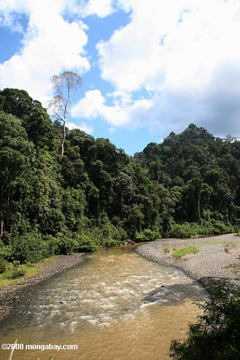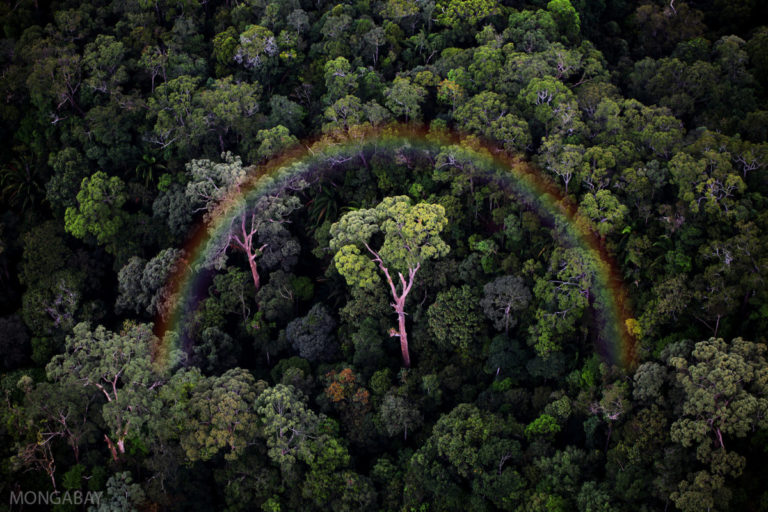Al Gore’s investment firm bets that rainforest conservation will be profitable
Al Gore’s investment firm bets that rainforest conservation will be profitable
Rhett Butler, mongabay.com
May 14, 2008
Al Gore’s investment firm has signaled an interest in the emerging market for ecosystem services by taking an equity position in an innovative Australian financial company.
Tuesday London-based Generation Investment Management announced a minority stake in Sydney-based New Forests Pty Limited, a firm that specializes in business models that deliver returns from environmental markets such as carbon, biodiversity and water. Al Gore is the chairman of Generation Investment Management.
“We see great opportunities for both ourselves and New Forests in this investment,” David Blood, Managing Partner of Generation Investment Management, said. “New Forests is creating substantial new IP and know-how in this high growth area, and we are interested in supporting the success of this business model.”

|
“We’re excited to welcome Generation Investment Management and continue to build on New Forests growth,” David Brand, Managing Director of New Forests, said. “We see tremendous opportunities for growth. This new partnership will allow us to maintain our position in these emerging markets and continue to build out a global business.”
New Forests has distinguished itself in recent months with investments in a wildlife conservation banking scheme on the island of Borneo and a rainforest conservation carbon deal in New Guinea. Both investments are based on the idea that ecosystem services will be increasingly valued by financial markets.
Over the past year several financial firms have announced similar deals.
In February, Merrill Lynch said it would invest $9 million over four years to protect endangered rainforest in the Indonesian province of Aceh. The financial giant expects to earn returns by selling carbon credits generated by preserving the forest. While such credits are presently not recognized under the Kyoto Protocol, delegates meeting at climate talks in Bali last December signaled that forestry would play a role in future emissions mitigation schemes. In the meantime the credits could be sold in voluntary markets. The deal, brokered by Australia-based Carbon Conservation, could generate up to $432 million in carbon financing over the next 30 years.
In a similar move, London-based Canopy Capital announced in March that it had purchased the rights to environmental services generated by a 371,000-hectare rainforest reserve in Guyana. The precedent-setting deal effectively enables Canopy Capital to profit from the services generated by a living rainforest — including rainfall generation, climate regulation, biodiversity maintenance and water storage — when and if the services are compensated by markets.
Related articles
 |
U.S. climate policy could help save rainforests
(5/14/2008) U.S. policy measures to fight global warming could help protect disappearing rainforests, says the founding partner of an “avoided deforestation” policy group. In an interview with mongabay.com, Jeff Horowitz of the Berkeley-based Avoided Deforestation Partners argues that U.S. policy initiatives could serve as a catalyst for the emergence and growth of a carbon credits market for forest conservation. REDD or Reducing Emissions from Deforestation and Degradation is a proposed policy mechanism that would compensate tropical countries for safeguarding their forests. Because deforestation accounts for around a fifth of global greenhouse gas emissions, efforts to reduce deforestation can help fight climate change. Forest protection also offers ancillary benefits like the preservation of ecosystem services, biodiversity, and a homeland for indigenous people.
 |
Investing to save rainforests
(4/2/2008) Last week London-based Canopy Capital, a private equity firm, announced a historic deal to preserve the rainforest of Iwokrama, a 371,000-hectare reserve in the South American country of Guyana. In exchange for funding a “significant” part of Iwokrama’s $1.2 million research and conservation program on an ongoing basis, Canopy Capital secured the right to develop value for environmental services provided by the reserve. Essentially the financial firm has bet that the services generated by a living rainforest — including rainfall generation, climate regulation, biodiversity maintenance and carbon storage — will eventually be valuable in international markets. Hylton Murray-Philipson, director of Canopy Capital, says the agreement — which returns 80 percent of the proceeds to the people of Guyana — could set the stage for an era where forest conservation is driven by the pursuit of profit rather than overt altruistic concerns.
Al Gore to launch $300 million ad campaign on global warming
(3/31/2008) This week Al Gore will launch a three-year, $300 million campaign to mobilize support for reining in greenhouse gas emissions, reports The Washington Post.
Merrill Lynch invests $9M in rainforest conservation, expects profit
(3/12/2008) Merrill Lynch’s investment in a rainforest conservation project in the Indonesian province of Aceh is worth $9 million over four years, reports Thomas Wright of The Wall Street Journal.
Could carbon credits-for-forest conservation (REDD) reduce terrorism and global warming?
(12/20/2007) Schemes to offer carbon credits for reducing deforestation rates in developing countries could improve American security by providing stable income to disaffected rural groups, argues a new Council on Foreign Relations report on the impact of climate change on U.S. national security.
Can wildlife conservation banking generate investment returns?
(11/27/2007) A commercial venture in the Malaysian rainforest will seek to generate competitive returns on investment by protecting wildlife. The scheme — signed by the Sabah government and Sydney-based New Forests Pty Ltd — will establish a wildlife habitat conservation bank to manage the 34,000 ha Malua Forest Reserve on the island of Borneo. Using money from its asset management business, New Forests will to fund rehabilitation and protection of Malua Forest Reserve, a tract of rainforest that supports orangutans and other endangered species. To generate financial returns for investors, New Forests will sell the value of the “forest conservation outcomes” as biodiversity protection credits to palm oil developers, energy firms, and other businesses seeking to provide consumers with environmentally sustainable products including eco-friendly biodiesel.
More carbon finance news














